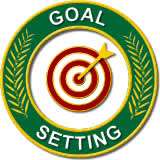
Personal Improvement, Research & Reports
 What happens in our heads when we set goals?
What happens in our heads when we set goals?
Apparently a lot more than you’d think. Goal setting isn’t quite so simple as deciding on the things you’d like to accomplish and working towards them.
According to the research of psychologists, neurologists, and other scientists, setting a goal invests ourselves into the target as if we’d already accomplished it. That is, by setting something as a goal, however small or large, however near or far in the future, a part of our brain believes that desired outcome is an essential part of who we are – setting up the conditions that drive us to work towards the goals to fulfill the brain’s self-image.
Apparently the brain cannot distinguish between things we want and things we have. Neurologically, then, our brains treat the failure to achieve our goal the same way as it treats the loss of a valued possession. And up until the moment the goal is achieved, we have failed to achieve it, setting up a constant tension that the brain seeks to resolve.
Ideally, this tension is resolved by driving us towards accomplishment. In many cases, though, the brain simply responds to the loss, causing us to feel fear, anxiety, even anguish, depending on the value of the as-yet-unattained goal.
Love, Loss, Dopamine, and Our Dreams
 The brains functions are carried out by a stew of chemicals called neurotransmitters. You’ve probably heard of serotonin, which plays a key role in our emotional life – most of the effective anti-depressant medications on the market are serotonin reuptake inhibitors, meaning they regulate serotonin levels in the brain leading to more stable moods.
The brains functions are carried out by a stew of chemicals called neurotransmitters. You’ve probably heard of serotonin, which plays a key role in our emotional life – most of the effective anti-depressant medications on the market are serotonin reuptake inhibitors, meaning they regulate serotonin levels in the brain leading to more stable moods.
Somewhat less well-known is another neurotransmitter, dopamine. Among other things, dopamine acts as a motivator, creating a sensation of pleasure when the brain is stimulated by achievement. Dopamine is also involved in maintaining attention – some forms of ADHD are linked to irregular responses to dopamine.
So dopamine plays a key role in keeping us focused on our goals and motivating us to attain them, rewarding our attention and achievement by elevating our mood. That is, we feel good when we work towards our goals.
Dopamine is related to wanting – to desire. The attainment of the object of our desire releases dopamine into our brains and we feel good. Conversely, the frustration of our desires starves us of dopamine, causing anxiety and fear.
One of the greatest of desires is romantic love – the long-lasting, “till death do us part” kind. It’s no surprise, then, that romantic love is sustained, at least in part, through the constant flow of dopamine released in the presence – real or imagined – of our true love. Loss of romantic love cuts off that supply of dopamine, which is why it feels like you’re dying – your brain responds by triggering all sorts of anxiety-related responses.
Herein lies obsession, as we go to ever-increasing lengths in search of that dopamine reward. Stalking specialists warn against any kind of contact with a stalker, positive or negative, because any response at all triggers that reward mechanism. If you let the phone ring 50 times and finally pick up on the 51st ring to tell your stalker off, your stalker gets his or her reward, and learns that all s/he has to do is wait for the phone to ring 51 times.

Romantic love isn’t the only kind of desire that can create this kind of dopamine addiction, though – as Captain Ahab knew well, any suitably important goal can become an obsession once the mind has established ownership.
The Neurology of Ownership
Ownership turns out to be about a lot more than just legal rights. When we own something, we invest a part of ourselves into it – it becomes an extension of ourselves.
In a famous experiment at Cornell University, researchers gave students school logo coffee mugs, and then offered to trade them chocolate bars for the mugs. Very few were willing to make the trade, no matter how much they professed to like chocolate. Big deal, right? Maybe they just really liked those mugs!
But when they reversed the experiment, handing out chocolate and then offering to trade mugs for the candy, they found that now, few students were all that interested in the mugs. Apparently the key thing about the mugs or the chocolate wasn’t whether students valued whatever they had in their possession, but simply that they had it in their possession.
This phenomenon is called the “endowment effect”. In a nutshell, the endowment effect occurs when we take ownership of an object (or idea, or person); in becoming “ours” it becomes integrated with our sense of identity, making us reluctant to part with it (losing it is seen as a loss, which triggers that dopamine shut-off I discussed above).
Interestingly, researchers have found that the endowment effect doesn’t require actual ownership or even possession to come into play. In fact, it’s enough to have a reasonable expectation of future possession for us to start thinking of something as a part of us – as jilted lovers, gambling losers, and 7-year olds denied a toy at the store have all experienced.
The Upshot for Goal-Setters
So what does all this mean for would-be achievers?
On one hand, it’s a warning against setting unreasonable goals. The bigger the potential for positive growth a goal has, the more anxiety and stress your brain is going to create around it’s non-achievement.
It also suggests that the common wisdom to limit your goals to a small number of reasonable, attainable objectives is good advice. The more goals you have, the more ends your brain thinks it “owns” and therefore the more grief and fear the absence of those ends is going to cause you.
On a more positive note, the fact that the brain rewards our attentiveness by releasing dopamine means that our brain is working with us to direct us to achievement. Paying attention to your goals feels good, encouraging us to spend more time doing it. This may be why outcome visualization — a favorite technique of self-help gurus involving imagining yourself having completed your objectives — has such a poor track record in clinical studies. It effectively tricks our brain into rewarding us for achieving our goals even though we haven’t done it yet!
But ultimately our brain wants us to achieve our goals, so that it’s sense of who we are can be fulfilled. And that’s pretty good news!

Personal Improvement
 The car is packed and you’re ready to go, your first ever cross-country trip. From the
The car is packed and you’re ready to go, your first ever cross-country trip. From the
White Mountains of New Hampshire to the rolling hills of San Francisco, you’re going to see it all.
You put the car in gear and off you go. First stop, the Baseball Hall of Fame in
Cooperstown, New York. A little while into the trip you need to check the map because you’ve reached an intersection you’re not familiar with. You panic for a moment because you realize you’ve forgotten your map. But you say the heck with it because you know where you’re going. You take a right, change the radio station and keep on going. Unfortunately, you never reach your destination.
Too many of us treat goal setting the same way. We dream about where we want to go, but we don’t have a map to get there.
What is a map? In essence, the written word
What is the difference between a dream and a goal? Once again, the written word
But we need to do more than simply scribble down some ideas on a piece of paper.
Our goals need to be complete and focused, much like a road map, and that is the purpose behind the rest of this article.
If you follow the 7 steps I’ve outlined below you will be well on your way to becoming an expert in building the road maps to your goals.
Life consists in what a man is thinking of all day.
-Ralph Waldo Emerson
1. Make sure the goal you are working for is something you really want, not just something that sounds good.
I remember when I started taking baseball umpiring more seriously. I began to set my sites on the NCAA Division 1 level. Why? I knew there was no way I could get onto the road to the major leagues, so the next best thing was the highest college level. Pretty cool, right. Wrong.
Sure, when I was talking to people about my umpiring goals it sounded pretty good, and many people were quite impressed. Fortunately I began to see through my own charade.
I have been involved in youth sports for a long time. I’ve coached, I’ve been the
President of leagues, I’ve been a treasurer and I’m currently an Assistant State Commissioner for Cal Ripken Baseball. Youth sports are where I belong; it is where my heart belongs, not on some college diamond where the only thing at stake is a high draft spot.
When setting goals it is very important to remember that your goals must be consistent with your values.
2. A goal cannot contradict any of your other goals.
For example, you can’t buy a $750,000 house if your income goal is only $50,000 per year. This is called non-integrated thinking and will sabotage all of the hard work you put into your goals. Non-integrated thinking can also hamper your everyday thoughts as well. We should continually strive to eliminate contradictory ideas from our thinking.
3. Develop goals in the 6 areas of life:
|
Family
|
and
|
Home
|
|
Financial
|
and
|
Career
|
|
Spiritual
|
and
|
Ethical
|
|
Physical
|
and
|
Health
|
|
Social
|
and
|
Cultural
|
|
Mental
|
and
|
Educational
|
Setting goals in each area of life will ensure a more balanced life as you begin to examine and change the fundamentals of everyday living. Setting goals in each area of life also helps in eliminating the non-integrated thinking we talked about in the 2nd step.
4. Write your goal in the positive instead of the negative.
Work for what you want, not for what you want to leave behind. Part of the reason why we write down and examine our goals is to create a set of instructions for our subconscious mind to carry out. Your subconscious mind is a very efficient tool, it cannot determine right from wrong and it does not judge. It’s only function is to carry out its instructions. The more positive instructions you give it, the more positive results you will get.
Thinking positively in everyday life will also help in your growth as a human being.
Don’t limit it to goal setting.

5. Write your goal out in complete detail.
Instead of writing “A new home,” write “A 4,000 square foot contemporary with 4 bedrooms and 3 baths and a view of the mountain on 20 acres of land.
Once again we are giving the subconscious mind a detailed set of instructions to work on. The more information you give it, the more clear the final outcome becomes. The more precise the outcome, the more efficient the subconscious mind can become.
Can you close your eyes and visualize the home I described above? Walk around the house. Stand on the porch off the master bedroom and see the fog lifting off the mountain. Look down at the garden full of tomatoes, green beans and cucumbers. And off to the right is the other garden full of a mums, carnations and roses. Can you see it? So can your subconscious mind.
6. By all means, make sure your goal is high enough.
Shoot for the moon; if you miss you’ll still be in the stars. Earlier I talked about my umpiring goals and how making it to the top level of college umpiring did not mix with my values. Some of you might be saying that I’m not setting my goals high enough. Not so. I still have very high goals for my umpiring career at the youth level.
My ultimate goal is to be chosen to umpire a Babe Ruth World Series and to do so as a crew chief. If I never make it, everything I do to reach that goal will make me a better umpire and a better person. If I make it, but don’t go as a crew chief, then I am still among the top youth umpires in the nation. Shoot for the moon!

7. This is the most important, write down your goals.
Writing down your goals creates the road-map to your success. Although just the act of writing them down can set the process in motion, it is also extremely important to review your goals frequently. Remember, the more focused you are on your goals the more likely you are to accomplish them.
Sometimes we realize we have to revise a goal as circumstances and other goals change, much like I did with my umpiring. If you need to change a goal do not consider it a failure, consider it a victory as you had the insight to realize something was different.

E-Books

You will learn:-
How you can develop the unique talents, powers, and abilities,
that we all possess, to undreamed of heights.
How to become rich and successful. and get anything you want from life.
How you can increase your powers of concentration, memory, or
physical stamina.
How to control and eradicate any fears or phobias that spoil and disrupt
your life and prevent you from enjoying your life to the full. For example fear of
flying, fear of insects, of enclosed spaces, or whatever, the list goes on and
on.
Smoking is one of the few vices that can be cured with one course of
Hypnosis! Think of all that money you could save each year if you gave up not
to mention the improvement in your health, more breath and energy, better
taste of food etc.
How to give confident public speeches.
How to become more popular and make friends easily.
How to improve your love and sex life!
In short anything you want from life is yours for the taking and
you are going to be shown how to get it in simple easy steps!
Click here to DOWNLOAD free eBook

E-Books
MASTER YOUR
MiND
DESIGN YOUR
DESTINY
Proven Strategies that Empower You to Achieve Anything You Want in Life
WARNING:
Reading this book and participating fully in all the
activities could positively change your life forever
CONTENTS
Acknowledgements
Introduction
About the Authors
Chapters
- The Patterns of Excellence
- The Ultimate Success Formula
- How to Achieve Anything You Want
- The Key to Absolute Power
- The Incredible Power of Beliefs
- The Secret of Peak Performance
- Directing Your Brain for Optimum Results
- Anchoring: the Keyboard to Your Emotions
- The Transformation of Meaning
- Values: Your Driving Force
- Design Your Destiny
- How to Replicate Someone’s Success Blueprint
Bibliography
There was once a professor who wanted to go down a river, so he approached a local boatman who agreed to row him downstream for a small sum of money.
As they wound their way down the river, the professor decides to show-off his intelligence and high education so he started to test the simple boatman.
Taking up a stone he had picked up from the riverbank, the professor arrogantly asks the boatman, ‘Have you ever studied Geology?’ The boatman looks at him blankly and replies, ‘Eh…, no.’, hardly even understanding what the word meant.
‘Then, I am afraid 25 percent of your life is gone!’ the professor loftily says.
The boatman feels really bad about his ignorance but continues to row on.
As they move further downstream, the river currents begin to get stronger and stronger. The professor picks up a leaf floating on the river and asks condescendingly, ‘Boatman, have you ever studied Botany?’
Confused the poor boatman again says, ‘No.’
The professor shakes his head and says, ‘Tsk tsk, then 50 percent of your life is gone.’ He then signals him to carry on rowing. As they move further downstream, the currents get even stronger, the water is moving faster and the boat begins to sway violently.
Suddenly the professor sees a mountain range, points to it and asks,
‘Do you know anything about Geography?’ Feeling very inferior and humiliated, the boatman again says ‘No.’
The professor snaps back. ‘I thought so. Then 75 percent of your life is gone!’
At this point, the river has become a raging torrent. The water is moving so swiftly that the boatman loses control of the small boat.
Suddenly, the fragile craft smashes against a huge boulder, springs a leak and begins to sink.
This time the boatman turns to the professor and asks, ‘Professor! Do you know how to swim?’ The professor fearfully replies, ‘No!’
‘Then, I am afraid 100 percent of your life is gone!’ says the boatman as he leaps off the boat and powers his way to safety on the shore.
Just like the river, we are living in times of rapid and evolutionary changes. Is the river of life going to get faster and more unpredictable? You bet! This is only just the beginning.
What took a decade to change now takes merely months. Think about this: it took 50 years for cassette tapes to replace records. It then took less than ten years for compact discs to replace cassette tapes. Soon after, it took less than five years for Mini-Discs to appear on the scene. Today, less than three years later, MP3s are looking to make everything else totally obsolete. Mega million-dollar businesses can become bankrupt because of obsolescence overnight. At the same time, small companies can become worldwide market leaders in just a few years. Similarly, a professional with years of experience and a high market value can become economically unviable within a short period of time. Why?
The new economy is so dynamic that 80 percent of what you learn in school will become obsolete by the time you graduate. 30 percent of the jobs, companies, products and services that are commonplace now never existed a decade ago.
Who ever heard of a chief information officer, a website designer, technopreneurs, internet service providers (ISPs) or net nannies in the
1990s? Similarly, 50 percent of the jobs that exist today will no longer exist in their present form ten years from now.
In fact, the average person will probably go through four career changes (not job changes) in their entire lifetime. Why? Simply because the jobs they have and the companies they work for will not exist for very long.
‘The world must change and leaders are the ones who change it’
These seem like scary times, but they can also be awesome times with unrealized opportunities for those who not only embrace the change but lead the change! With change, comes incredible opportunity. Think about it!
There are now a hundred times more millionaires and many more billionaires as compared to decades past. And unlike the past when most of them were in their fifties, today’s billionaires are in their thirties! Today, with an innovative idea, you could become the owner of a billion dollar company in less than ten years. Think of Amazon.com, E-Bay, Oracle or Hotmail.
Do you have what it takes to swim in the dynamic and ever changing river of life? Will you crest the new age waves or get caught in the deadly undertow?
Will you be like the professor who thinks he knows everything but drowns in the river of the real world? You and I both know that academic success, knowledge and intelligence are no guarantees of success in the new economy. In fact, they could mean very little.
Some of the movers and shakers of the new economy are school dropouts who employ ‘professors’ to run their businesses. Bill Gates
(Microsoft), Larry Ellison (Oracle) & Richard Branson (Virgin group) never finished school.
While education and academic qualifications are important, they are not enough if you want to make it in these turbulent evolutionary times. Those who are the most successful in the new economy are not necessarily the ones with the highest IQ or the most letters behind their name. It is those who exhibit certain patterns of excellence.
The patterns of excellence I refer to is the ability to take charge of your mental resources and unleash your personal power! It is a set of beliefs, attitudes and behaviors exhibited by individuals who consistently produce exceptional results.
It is the ability to take charge of your life, be in control of your emotional state and bring out the best of your personal potential. It is about having the flexibility to constantly grow by learning, unlearning and relearning. It is the ability to model and replicate excellence within a very short period of time. It is being able to constantly respond in an empowering way to the events swirling around you.
Those who lack ‘swimming’ skills (professors, professionals or just plain ordinary people) will continue to be controlled by their external environment and be ruled by the fear of change and unpredictability.
They will end up frustrated and powerless victims of this massive wave of globalization, restructuring and change. Those who can ‘swim’ and ride this wave will experience wealth, success and fulfillment beyond their wildest imagination.
In this book, you will learn how to equip yourself with the mindset, skills and behavioral patterns to do just this. You will be armed with the patterns of excellence so you can master your mind and design your destiny – whatever the external circumstances.

 What happens in our heads when we set goals?
What happens in our heads when we set goals? The brains functions are carried out by a stew of chemicals called neurotransmitters. You’ve probably heard of serotonin, which plays a key role in our emotional life – most of the effective anti-depressant medications on the market are serotonin reuptake inhibitors, meaning they regulate serotonin levels in the brain leading to more stable moods.
The brains functions are carried out by a stew of chemicals called neurotransmitters. You’ve probably heard of serotonin, which plays a key role in our emotional life – most of the effective anti-depressant medications on the market are serotonin reuptake inhibitors, meaning they regulate serotonin levels in the brain leading to more stable moods.


 The car is packed and you’re ready to go, your first ever cross-country trip. From the
The car is packed and you’re ready to go, your first ever cross-country trip. From the



